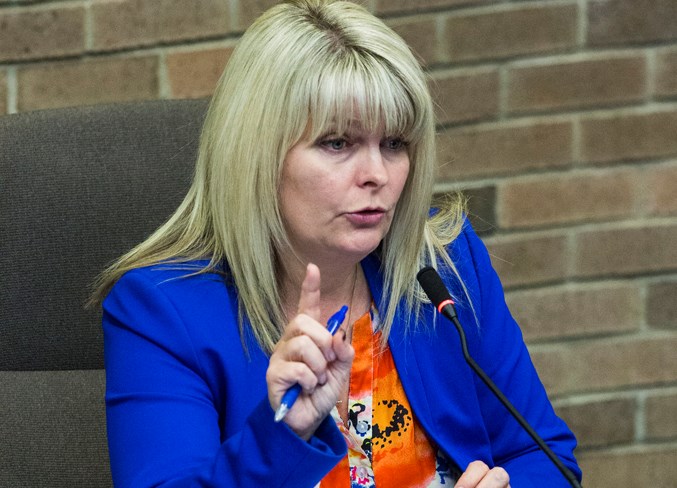Alberta’s provincial government introduced legislation last week that will give cabinet new authority over municipalities, a move that demonstrates “a lack of respect for voters,” says St. Albert Mayor Cathy Heron.
Bill 20, The Municipal Affairs Statutes Amendment Act, would allow cabinet to remove city councillors if doing so is “in the public interest” and undo city bylaws that conflict with the provincial government’s vision for Alberta.
“Mayor and council are representative of the community,” Heron said. “If a community's priorities don't align with the provincial ones, the province should not be able to step in and change it.”
St. Albert’s city council and its various bylaws aren’t likely to be a problem for the province, Heron said. However, she fears that the bill makes it too easy for the province to intervene in municipal affairs.
The province already has the power to remove city councillors and undo bylaws. However, Bill 20 would allow cabinet to make these decisions behind closed doors and with greater expediency.
“What's the point of having an elected council?” she said. “I hear the premier talk about asking the prime minister to stay in his lane and his level of government, but at the same (time) she's overstepping her role.”
During a press conference last week, Municipal Affairs Minister Ric McIver said that there were some guardrails around the legislation.
“If cabinet makes a flippant decision or one that the public thinks is… an unreasonable partisan, selfish decision, I think that the cabinet would be a great risk of being held accountable at the next general provincial election, and it may cost cabinet dearly,” he said.
Electronic tabulator ban could cost city
Bill 20 will ban the use of electronic vote tabulators for local elections. These tools are used to count ballots in many municipalities across the province, including St. Albert.
“We're going to have to pay people to count those ballots,” Heron said.
In addition to slowing the vote-counting process, “taxes are going up to do this,” she said.
In the 2021 St. Albert municipal election, the city spent about $55,000 using paper ballots and electronic tabulators, according to Marta Caufield, the city’s director of legal, legislative and records services.
“Given that the city has not [used hand counting] in at least over two decades, which is as far back as we have verified in our records to date, it is extremely difficult to predict what the cost of this would be in 2025,” Caufield said in an email.
Caufield didn’t have enough information to say whether there would be an impact on city taxes.
Heron said doing away with electronic tabulators would increase the odds of the city having to do recounts.
McIver told reporters last week that the reason for banning electronic tabulators was that some Albertans don’t trust the devices.
“You're punishing the majority of Alberta by asking them to do these silly hand counts,” Heron said. “It's antiquated.”
Heron wouldn’t run as a member of a party
The province will introduce political parties to municipal elections as part of a four-year pilot project in Calgary and Edmonton.
The municipal parties will not have financial ties to federal or provincial political parties, McIver said. Heron wasn’t reassured by this announcement.
Alberta’s two-party, partisan binary will simply be reinforced at the local level, she said.
“Let's say there are five councillors from one party and two from another,” she said. “Are those two voices from the other party … null and void for the next four years? Is there any point in showing up to an open council meeting and listening to your colleagues and having a good wholesome debate?”
Councillors will be permitted to run as independents in the Edmonton/Calgary pilot project and in other municipalities should Alberta’s UCP government extend the policy provincewide.
“If you're going to get elected, you're going have to run as a party,” Heron said. “Unless some of the incumbents can stand their ground on name recognition. But that won't last very long.”
Heron said she would not run as a member of a municipal political party.
McIver said that during consultations 70 per cent of Albertans said they did not want political parties.
The ability for councillors to run as members of a municipal political party has “always been there,” he said, and “putting formal rules around it will only happen in the two largest municipalities.”
“There's pretty good evidence that party affiliation and organization already happens in the two big cities,” he said.
Some changes for the better
Heron said that she was pleased to see some new policies, such as allowing municipalities to do criminal background checks on candidates.
She hadn’t yet considered whether St. Albert would pursue criminal record checks.
She was also happy to see the province cap donations to third-party advertisers at $5,000 per election period.
The bill will allow unions and corporations to donate to local politicians. However, the donation limit will be $5,000. The donation limit for individuals will also be lowered to $5,000 from $30,000.
“I do honestly think that most Albertans don't want big money in elections,” Heron said.




